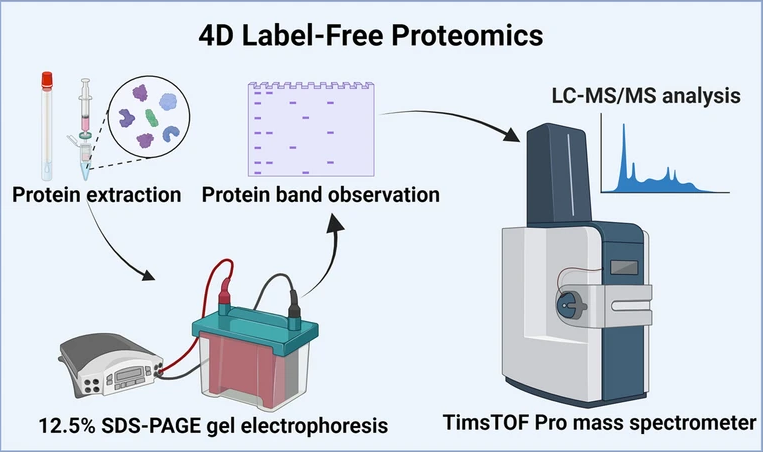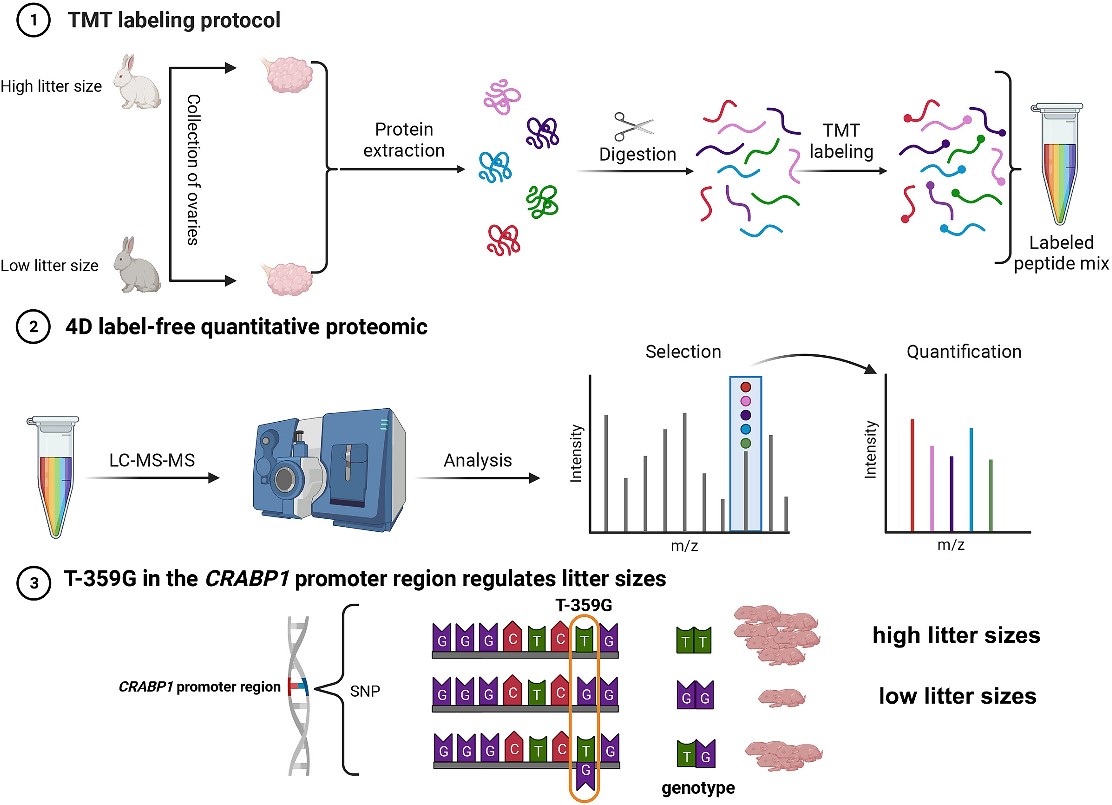4D Label-free Quantitative Proteomics Analysis Service
4D label-free quantitative proteomics is an unlabeled, high-throughput protein quantification technology that integrates liquid chromatography (LC), high-resolution mass spectrometry (MS), fragmentation ions (MS/MS), and ion mobility (IM) dimensions to achieve more efficient and precise protein identification and quantification. This method is based on Trapped Ion Mobility Spectrometry (TIMS) technology, which enhances protein and peptide separation by adding the ion mobility (IM) dimension, reducing background interference from complex samples, and providing more accurate and reliable quantification data. It also enables higher protein coverage and sensitivity.
4D label-free quantitative proteomics analysis service is widely used in fields such as disease research, biomarker discovery, drug development, immunology, metabolic research, precision medicine, agriculture, and food science. For example, this technology can be applied to proteomics analysis of cancer, neurodegenerative diseases, and cardiovascular diseases to identify key disease-related proteins. In drug development, it can be used to screen potential targets and assess drug mechanisms of action. Additionally, this technology is valuable for biopharmaceutical development and quality control, such as purity testing for antibody drugs, vaccines, and protein therapies, ensuring product stability and safety.

Jiang, H. et al. BMC Pregnancy and Childbirth, 2024.
Figure 1. Detection Flow of 4D Label-free Proteomics.
Services at MtoZ Biolabs
Based on the timsTOF Pro 2 and timsTOF HT mass spectrometry platforms, combined with TIMS technology, MtoZ Biolabs offers 4D label-free quantitative proteomics analysis service with high sensitivity and high resolution. You only need to tell us your experimental objectives and send your cells to us. We will take care of all subsequent aspects of the project, including cell culture, cell labeling, protein extraction, protein digestion, peptide separation, 4D mass spectrometry detection and analysis, raw mass spectrometry data analysis, and bioinformatics analysis.
Service Advantages
1. Advanced Analysis Platform
MtoZ Biolabs established an advanced 4D label-free quantitative proteomics analysis service platform, guaranteeing reliable, fast, and highly accurate analysis service.
2. One-Time-Charge
Our pricing is transparent, no hidden fees or additional costs.
3. High-Data-Quality
Deep data coverage with strict data quality control. AI-powered bioinformatics platform integrates all proteomics analysis data, providing clients with a comprehensive data report.
4. Customized Solutions
MtoZ Biolabs provides tailored services to address your unique research questions and experimental needs.
Sample Submission Suggestions
1. Sample Types & Sample Amount
(1) Animal Tissue: ≥20 mg;
(2) Plant Tissue: ≥2 g;
(3) Microorganisms: ≥50 mg;
(4) Cells: ≥1×107;
(5) Serum/Plasma: ≥10 μL;
(6) Urine: ≥1 mL;
(7) Protein Extracts: ≥20 μg.
Note: If you have any specific requirements or need assistance with sample preparation, please contact us.
Applications
1. Disease Research and Biomarker Screening
Through high-throughput, high-precision quantitative protein analysis, this service reveals changes in the expression of disease-related proteins, aiding in the early diagnosis and precision treatment of cancer, neurodegenerative diseases, cardiovascular diseases, and more.
2. Drug Development and Mechanism Analysis
4D label-free quantitative proteomics analysis service can be used to screen drug targets, investigate drug mechanisms of action, and assess drug responses. This helps optimize the drug development process, evaluate drug efficacy, and identify potential toxicity.
3. Cell Signaling Pathways and Functional Research
4D label-free quantitative proteomics technology can analyze protein expression and post-translational modifications (PTMs) under different physiological or pathological states, revealing dynamic changes in key biological signaling pathways.
4. Immunology and Tumor Microenvironment Research
Through 4D label-free quantitative proteomics analysis of immune-related proteins, this service explores the dynamic changes in immune cell function, inflammatory response, and tumor microenvironment, providing data support for immunotherapy and personalized medicine.
5. Agriculture and Food Science
4D label-free quantitative proteomics analysis service can be used in crop resistance research, food quality control, and functional food ingredient identification, supporting agricultural biotechnology and food safety testing.
6. Biological Product Development and Quality Control
In the development and production of biological products such as antibody drugs, vaccines, and protein therapies, protein purity testing and batch stability monitoring are carried out to ensure product quality and safety.
Case Study
1. 4D Label-free Quantitative Proteomic Analysis Identifies CRABP1 as a Novel Candidate Gene for Litter Size in Rabbits
This study aims to identify key regulatory proteins affecting litter size in rabbits and explore their molecular mechanisms using 4D label-free quantitative proteomics technology. The study focused on ovarian tissues from high-reproductive (12.35 offspring/litter) and low-reproductive (6.67 offspring/litter) female rabbits with significant differences in litter size. Differentially expressed proteins were identified through 4D-LC-MS/MS technology combined with bioinformatics analysis. The results showed 89 significantly differentially expressed proteins in the high-reproductive group, with a marked increase in the expression of retinoic acid binding protein CRABP1 in the high-reproductive group. Bioinformatics analysis revealed that these differential proteins are primarily involved in reproductive biological processes such as steroid hormone synthesis, oocyte maturation, and significantly enriched in retinol metabolism pathways. Further validation using qRT-PCR and immunohistochemistry confirmed that CRABP1 was highly expressed in ovarian granulosa cells, and knocking out CRABP1 significantly inhibited granulosa cell proliferation and promoted apoptosis, while overexpression exhibited the opposite effects. This gene could serve as a potential target for molecular breeding of rabbit reproductive traits and provides new perspectives for the study of mammalian reproductive mechanisms.

Bao, Z Y. et al. Biology of Reproduction, 2024.
Figure 2. 4D Label-free Quantitative Proteomic Analysis Workflow.
Deliverables
1. Complete Experimental Report
2. Mass Spectrometry Parameters and Data
3. Identified Proteins and Quantification Results
4. Differential Protein Analysis
5. Bioinformatics Analysis
6. Raw Data Files
MtoZ Biolabs, an integrated Chromatography and Mass Spectrometry (MS) Services Provider, provides advanced proteomics, metabolomics, and biopharmaceutical analysis services to researchers in biochemistry, biotechnology, and biopharmaceutical fields. Our ultimate aim is to provide more rapid, high-throughput, and cost-effective analysis, with exceptional data quality and minimal sample consumption. Free project evaluation, welcome to learn more details!
How to order?







